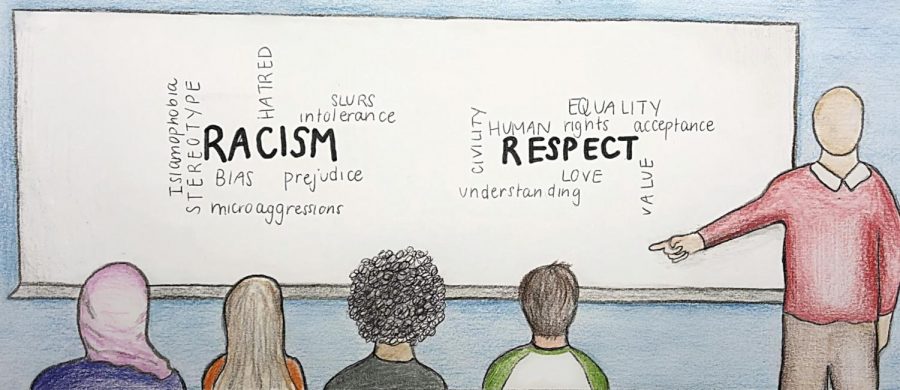Racism at South prompts the need for discussions on sensitivity
November 15, 2019
While walking through the halls of South, one might hear conversations about weekend plans or homework complaints. However, Andrea Ball-Ryan, Black Student Union sponsor and South social worker, expressed that she became aware of racial slurs and microaggressions in conversations at South from students and staff.
An instance where such conversation caught the attention of South took place leading up to the start of homecoming week, when Student Council was obligated to change the homecoming theme from “Into the Jungle” to “The Rainforest.” Principal Dr. Lauren Fagel expressed the concerns in an email sent Oct. 5th, saying “…possible interpretations associated with the word ‘jungle’ may be associated with racism.”
To avoid further confusion, The Oracle Editorial Board strongly suggests that the administration implement mandatory discussions to promote awareness of racial sensitivity and derogatory words.
The use of discussions could potentially break the “Glenview Bubble” and give a voice to the marginalized groups at South. Lena Sanchez, an African American and Latina who graduated from South in 2018, emphasized the negative impacts of the “Glenview Bubble.”
“[The Glenview Bubble is] when [students] don’t think things are bad and don’t experience discrimination,” Sanchez said. “It’s a system of passed-down wealth, and they’re very sheltered from real-world experiences.”
Along with Sanchez, Emily Ekstrand, Latin American history teacher and SOAR sponsor, stressed that the “Glenview Bubble” does not prepare students adequately for life after high school.
As a teacher, Ekstrand brings discussions about race into her classroom to prepare her students for encounters both academically and in the real world. However, Ekstrand has noticed through the discussions that the dominant group will take over the conversation while the marginalized groups have little room for their voices to be heard.
“I think that it is necessary for members of the dominant group to listen more than they talk,” Ekstrand said. “It’s important that the instructor allows every voice to be heard, but also protects the students who might feel more marginalized.”
The Oracle Editorial Board suggests that such conversations be incorporated within history, English, or language classes. Additionally, the Editorial Board believes that there should be a block each school year dedicated to informing the student body about the connotations of insensitive words, along with an in-depth discussion on why it is critical to remove certain words from their vocabulary.
71 percent of South students think that South needs to do a better job of incorporating such discussions within the curriculum, according to an unscientific, Oracle-conducted survey of 360 students. Whereas 29 percent disagree and believe that the discussions would not be necessary.
Whitney M. Young Magnet High School in Chicago has courses dedicated to the discussion of race, such as Ethnic Studies, African American Studies or Global Citizenship, according to Hannah Hansraj, a senior at Whitney Young. She emphasized that since some students feel uncomfortable from such discussions, it helps to put the conflict in context and ease the tension.
“The majority of people who are uncomfortable come from a white background,” Hansraj said. “[If they] draw from an experience where they [felt marginalized], they can better understand what people of color have to deal with on a daily basis.”
While South does an exceptional job in preparing students academically, evidenced in part by a 97 percent graduation rate, according to niche.com, there is a drop off in being well-prepared for real-world conversations. Considering the variety of cultures within the country and its increasing diversity, racial awareness is essential to being well-prepared for college and life.



